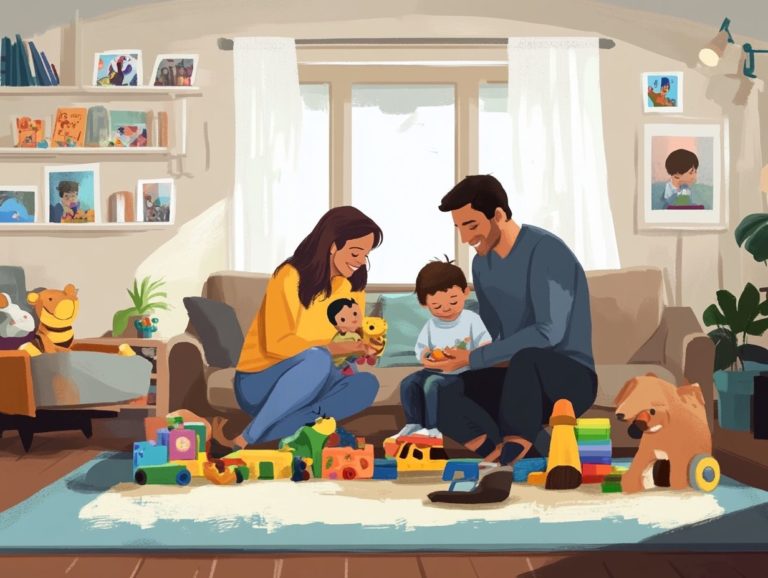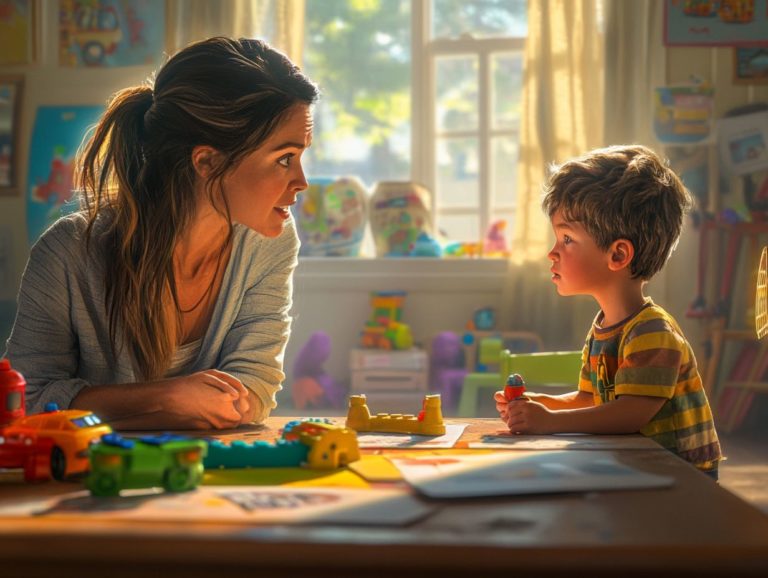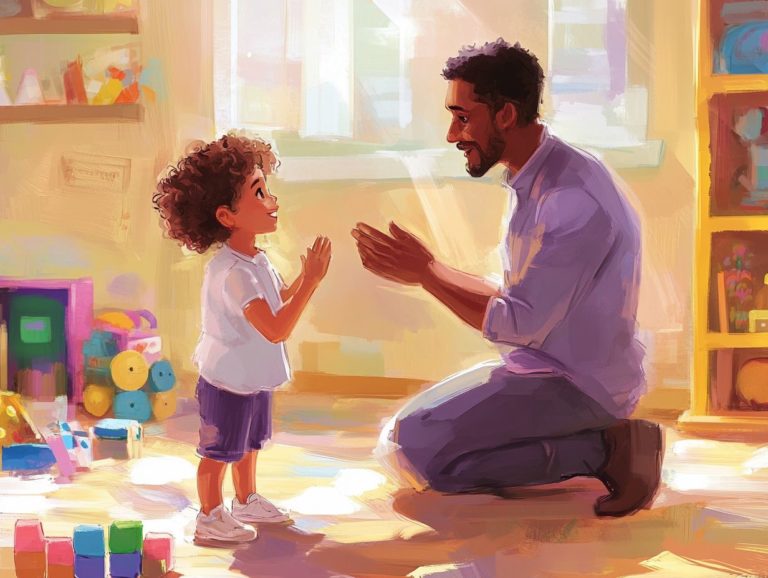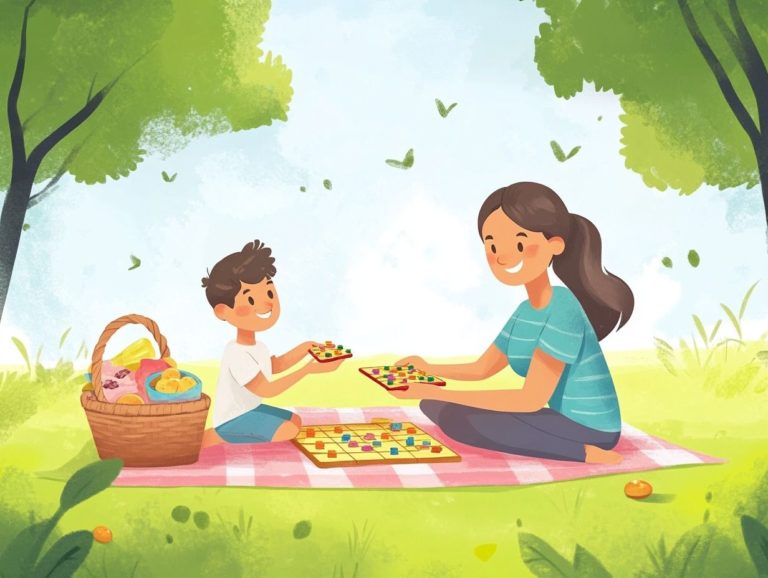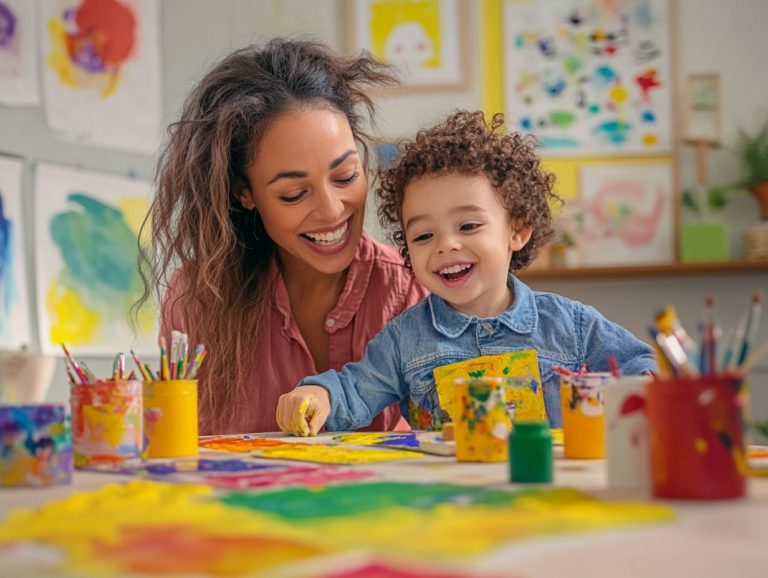How to Support Your Child’s Social Skills
In today s interconnected world, social skills are vital for children to flourish both personally and academically. Recognizing what social skills entail and their significance creates a strong foundation for nurturing these abilities in your child.
Get ready as this article reveals practical strategies to support your child’s social development, such as encouraging playdates and modeling positive behaviors. You ll discover engaging activities designed to enhance their social competence, as well as insights on when it might be appropriate to seek professional guidance or learning support professionals.
Embark on this journey with us as we explore this essential facet of childhood development, including character building and managing social anxiety.
Contents
- Key Takeaways:
- What Are Social Skills?
- Why Are Social Skills Important for Children?
- How Can You Support Your Child s Social Skills?
- Improving Your Child’s Social Skills
- 7. Encourage Involvement in Group Activities for Kids
- What Are Some Activities That Can Help Improve Social Skills in Kids?
- 1. Role-Playing Scenarios
- When Should Parents Seek Professional Help for Their Child s Social Skills?
- Frequently Asked Questions
- 1. What are social skills and why are they important for my child to develop?
- 2. How can I support my child s social skills at home?
- 3. My child is shy and has difficulty making friends. How can I help them improve their social skills?
- 4. How can I teach my child to handle conflicts and disagreements with their peers?
- 5. Concern About Your Child’s Social Development Compared to Peers
- 6. Resources to Help Improve Your Child’s Social Skills
Key Takeaways:
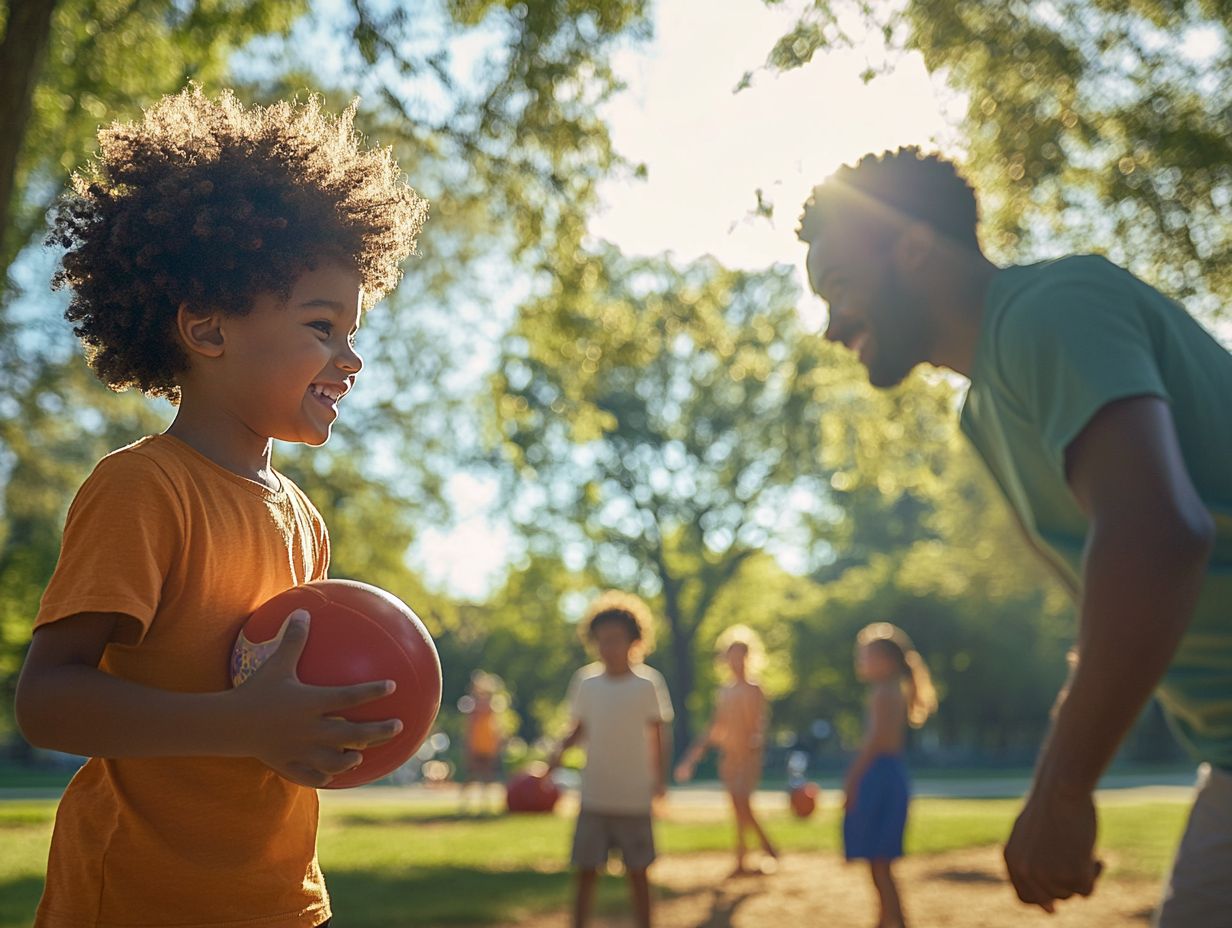
- Encourage social interactions and playdates to help develop your child’s social skills.
- Model positive social behavior and teach empathy and perspective-taking to support your child’s social development, while also normalizing mistakes as part of the learning process.
- Provide opportunities for problem-solving and practice communication skills, such as verbal expressions and self-monitoring, to improve your child’s social skills.
What Are Social Skills?
Social skills encompass a broad spectrum of abilities and behaviors that empower you to engage effectively with others, facilitating communication, collaboration, and connection with your peers in diverse settings.
These essential skills include listening, sharing, following directions, and respecting boundaries. Each of these contributes significantly to your emotional development and self-regulation, helping you navigate the complexities of social interactions.
Honing these skills can elevate your emotional intelligence and personal capabilities, establishing a solid foundation for healthy relationships and emotional stability throughout your life. Engaging in purposeful learning through SEL programs can further enhance these skills.
Why Are Social Skills Important for Children?
Social skills are essential for children, significantly contributing to their self-esteem, problem-solving abilities, and emotional growth. By mastering these skills, your child can engage in positive interactions with peers, forge meaningful friendships, and effectively manage their emotions. This support for self-esteem is crucial for their overall development.
The ability to collaborate and cooperate with others bolsters academic success and plays a vital role in character development and long-term social competence. Programs like Sesame Street, codeSpark, and HOMER can be beneficial in this regard.
How Can You Support Your Child s Social Skills?
Supporting your child s social skills calls for a thoughtful blend of strategies designed to nurture their emotional and cognitive development while embedding essential values like patience, empathy, and cooperation. Effective strategies and online programs like learning memberships can be very helpful.
You can encourage sharing by organizing structured playdates and guided interactions, which create opportunities for meaningful peer connections and help normalize mistakes as valuable learning experiences.
By modeling positive behaviors and offering constructive feedback, you can significantly enhance your child s ability to navigate social situations with confidence and grace.
Have you noticed your child struggling in social situations? Take the first step towards supporting their social skills today!
Improving Your Child’s Social Skills
1. Encourage Playdates and Social Interactions
Encouraging playdates and social interactions is one of the most beneficial ways to enhance your child’s social skills. These experiences foster cooperation and emotional development, allowing your child to thrive.
Frequent interactions with peers help them practice sharing, develop patience, and respect boundaries. Through these interactions, children can explore activities that promote friendship and effective communication both essential components of strong social skills.
Encourage sharing during these playdates to further enhance their social development. Engaging in structured playdate activities such as games where children work together, art projects, or group storytelling teaches your child how to work together and navigate different perspectives.
For example, team-based games that require strategizing can significantly enhance their problem-solving and teamwork skills. These activities can also help normalize mistakes as part of the learning process, promoting a growth mindset.
As a parent, you play a crucial role in orchestrating these interactions. By encouraging positive behaviors like turn-taking and empathetic listening, you ensure that each child feels valued and understood.
Facilitating discussions about feelings and responses during play helps develop emotional intelligence, enabling your child to recognize and articulate their own emotions as well as those of their peers.
Online quizzes and programs can also provide additional support in this area. Let’s create unforgettable playdate memories that your child will cherish!
2. Model Positive Social Behavior
Modeling positive social behavior is crucial for your children’s learning, as they tend to emulate the actions and attitudes of the adult authority figures surrounding them. By demonstrating empathy and effective communication skills, you can instill a sense of character development in your children.
This behavior modeling encourages them to practice patience, positivity, and cooperation in their own interactions with peers. For instance, when you actively listen to each other during conversations or express gratitude, you showcase the value of respectful communication.
A simple act, such as sharing toys and taking turns, serves as a powerful example of collaboration and understanding. By addressing feelings openly whether expressing joy or frustration you teach your children how to navigate their emotions and recognize those in others.
This approach also supports self-instruction and self-reinforcement in their daily routines. Over time, these nurtured skills foster strong relationships, enabling your children to develop empathy, resolve conflicts peacefully, and engage positively within their communities.
These foundational skills not only enhance their current social environments but also pave the way for healthy relationships in adulthood.
3. Teach Empathy and Perspective Taking
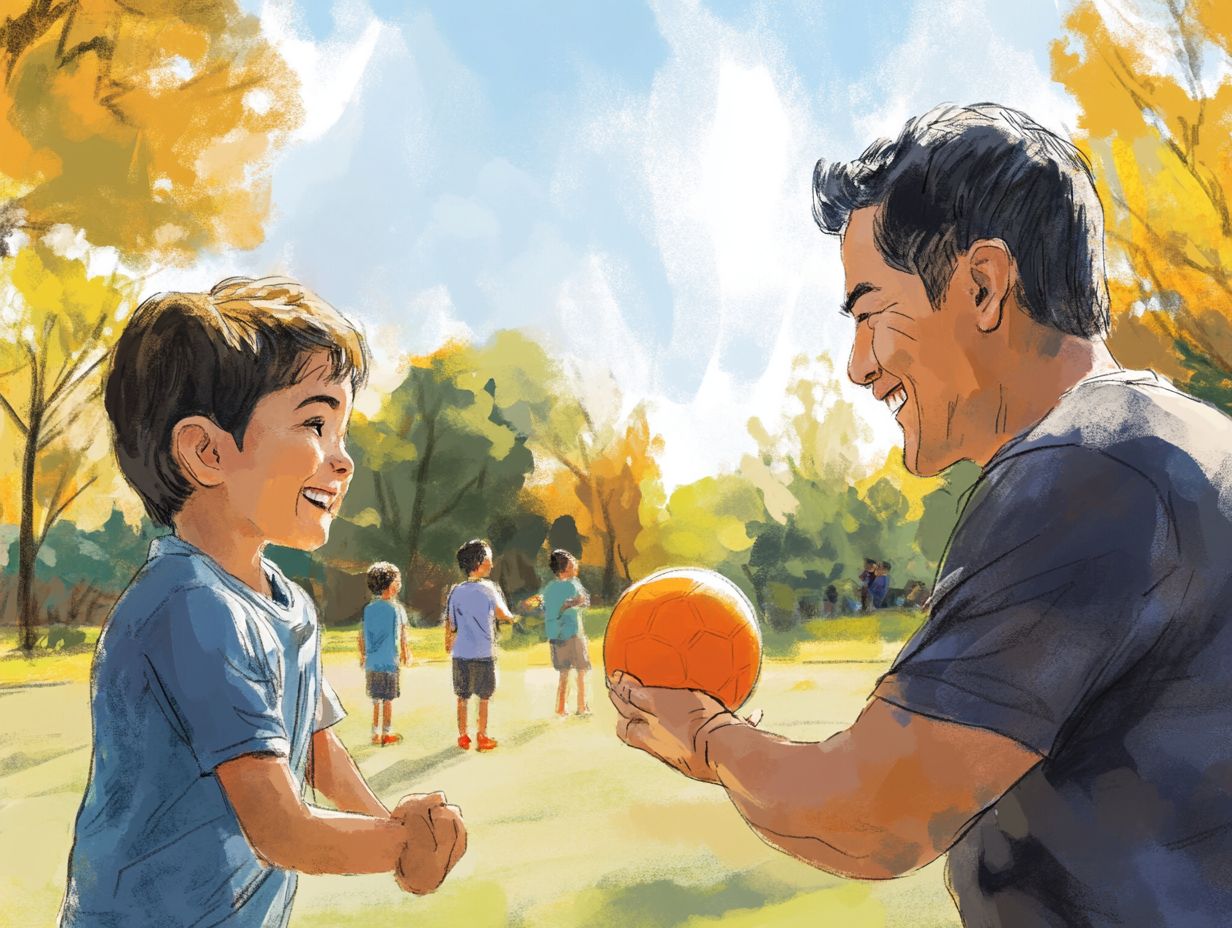
Teaching empathy and perspective-taking is essential for cultivating strong social skills in children. It significantly enhances their emotional intelligence and fosters character development.
By guiding kids to understand and consider the feelings and viewpoints of others, you can encourage them to engage in more meaningful and respectful interactions with their peers.
This practice not only promotes cooperation but also equips them with the necessary tools to navigate complex social situations throughout their lives. Tools like role-playing can be particularly effective in this regard.
One effective way to instill these vital skills is through role-playing activities, where children step into someone else’s shoes and articulate that character’s feelings or thoughts during a scenario.
For example, discussing a storybook and asking them how the characters might feel can spark invaluable conversations about emotions. Facilitating group discussions centered on real-life dilemmas provides kids with opportunities to practice perspective-taking.
These activities make them more adept at understanding diverse viewpoints and also support their overall cognitive skills development. As they hone these skills, children often discover that their relationships become richer and more fulfilling.
This showcases the undeniable link between empathy and improved social interactions.
In conclusion, actively engaging with your child through playdates, modeling positive behavior, and teaching empathy will greatly enhance their social skills. These efforts will not only benefit their current interactions but will also lay a strong foundation for their future relationships.
4. Practice Communication Skills
Practicing communication skills is essential for children. It empowers them to express their thoughts and feelings effectively and lays a solid foundation for successful social interactions.
One effective way to nurture these skills is through role-playing activities. These allow kids to simulate various scenarios, helping them articulate their emotions and thoughts in a safe environment.
Engaging in group discussions encourages children to listen attentively and respond thoughtfully. This practice boosts self-esteem and aids in emotional management.
Incorporating storytelling into their routine improves vocabulary and teaches the art of conveying emotions. As children become more proficient, they are likely to experience healthier peer interactions, leading to a more enriching social life.
5. Provide Opportunities for Problem-Solving
Providing opportunities for problem-solving helps children develop critical thinking and self-regulation, which are vital for effective social skills. Engaging kids in activities that require exploration and goal-setting enhances their ability to navigate challenges and collaborate with peers.
This collaboration promotes cooperation and nurtures emotional development through shared successes and learning experiences. Parental involvement in these activities strengthens family bonds.
Integrate problem-solving skills into daily routines, like planning a family meal or organizing a group project. This encourages children to think both creatively and critically.
Participating in group challenges like escape rooms or team sports sharpens these skills, requiring effective communication and teamwork. These activities provide a platform for encouraging themselves and learning from each other.
For example, a simple game where kids build a structure using limited materials sparks exciting discussions about strengths, weaknesses, and the essence of effective teamwork.
Such experiences cultivate essential social skills, instilling empathy, resilience, and the mindset to view challenges as opportunities for growth. These activities also support self-regulation and other key cognitive skills.
6. Teach Social Cues and Body Language
Teaching social cues and body language is crucial for helping children refine their communication skills and navigate peer interactions. When kids understand non-verbal signals and body language subtleties, they can interpret emotions and respond appropriately.
This awareness fosters cooperation, patience, and empathy, laying a solid foundation for positive interactions.
In everyday scenarios, like playing games or engaging in group activities, children can observe how facial expressions and gestures convey emotions such as excitement or disappointment.
Incorporating role-playing exercises is also effective; for instance, reenacting scenarios like greeting a friend or resolving a conflict allows kids to practice interpreting and using body language in a fun way.
By simulating real-life encounters, children become more skilled at recognizing subtle cues and respecting boundaries. This ultimately enhances their emotional intelligence.
Skillfully recognizing emotional cues boosts their communication skills and nurtures empathy, helping them better understand the feelings and perspectives of others.
7. Encourage Involvement in Group Activities for Kids
Encouraging your child to engage in group activities encourages teamwork and working together, which are crucial for developing social skills and learning to follow directions. By participating in team-based sports, clubs, or community service projects, your child gets to practice vital skills like sharing, listening, and striving towards common goals.
This collaborative environment not only aids in character building but also enhances emotional development, as they learn to navigate relationships with a diverse range of peers.
These experiences create a wonderful sense of belonging, helping your child forge friendships rooted in trust and mutual respect. Activities like group art projects, drama clubs, or even book clubs create spaces where children can effectively communicate their ideas and feelings. Outdoor adventures, such as team hikes or group games, further encourage teamwork and compromise, teaching them the importance of supporting one another.
Ultimately, these group activities cultivate essential skills, such as the ability to manage emotions and behavior and goal setting, that equip your child for future collaborative environments, both academically and socially, enriching their overall development in remarkable ways.
What Are Some Activities That Can Help Improve Social Skills in Kids?
Engaging in targeted activities aimed at enhancing social skills can profoundly elevate your child s ability to interact positively with their peers. Consider incorporating role-playing, cooperative games, and arts and crafts projects into their routine. It’s also beneficial to explore activities that promote verbal expressions and effective communication.
These activities not only promote teamwork but also create valuable opportunities for your child to practice empathy, effective communication, and problem-solving skills. Such structured experiences are crucial for nurturing emotional development and forging lasting friendships. Using character development techniques and positive reinforcement can further enhance these skills.
1. Role-Playing Scenarios

Role-playing scenarios present an engaging way for you to help children practice social skills within a controlled environment, allowing them to build empathy and enhance their communication abilities. By acting out various social situations, kids can learn how to navigate emotions, understand different perspectives, and develop the confidence essential for real-life interactions.
This hands-on approach not only fosters valuable problem-solving skills but also encourages positive peer relationships. For example, children can simulate scenarios like making new friends at school, resolving conflicts during group activities, or participating in a class discussion.
These enactments give them the opportunity to express their thoughts and feelings while promoting active listening, negotiation skills, and managing emotions. The benefits of role-playing extend far beyond mere practice; it creates a safe space for children to explore different social roles, helping them navigate complex dynamics and cultivate a deeper understanding of empathy.
By engaging in these activities, they can witness firsthand how their actions and words influence others, ultimately enhancing their ability to communicate effectively in a variety of social settings. Utilizing SEL programs and behavior modeling can further support this development.
In conclusion, supporting your child s social skills through group activities and structured scenarios can lead them to thrive in both personal and academic environments. Are you ready to support your child’s social skills in fun ways?
2. Cooperative Games
Cooperative games serve as exceptional tools for fostering teamwork and cultivating essential communication skills among children. In engaging in these games, players work harmoniously towards a common goal, which encourages teamwork and enhances their ability to participate in positive social interactions. These games accept mistakes and encourage a growth mindset, which is vital for emotional development and building self-esteem.
You can explore a variety of cooperative games, such as trust falls, group-building challenges, and problem-solving tasks. Each game engages participants in unique and meaningful ways. Trust falls, for instance, encourage reliance on peers, creating a sense of safety and assurance within the group dynamic. These activities also help with self-monitoring and self-instruction.
Group challenges, like constructing a bridge with limited materials, promote brainstorming and celebrate diverse perspectives, allowing each team member to contribute their strengths.
Problem-solving tasks demand effective communication, as players navigate obstacles together and strategize their approach. These interactions enhance social skills and impart invaluable lessons in empathy, respect, and emotional intelligence. This promotes personal capability and establishes a strong foundation for healthy relationships and resilience in real-world settings.
3. Arts and Crafts Projects
Arts and crafts projects present wonderful opportunities to unleash your creativity while honing social skills through collaboration and sharing. Engaging in creative tasks with others encourages you to articulate your ideas, actively listen to your peers, and negotiate towards a shared artistic vision. These experiences cultivate patience and respect for boundaries, which are vital for fostering positive social interactions. Encouraging sharing and listening during these activities can significantly enhance the experience.
When you collectively work on a large mural, you ll delegate tasks, discuss design elements, and agree on color schemes. This collaboration enhances your ability to work as part of a team and enriches the creative process itself.
Crafting projects like making friendship bracelets or designing a group sculpture not only promote teamwork but also nurture empathy as you learn to appreciate different perspectives and emotions. Such interactions are priceless, teaching you how to articulate your feelings while developing an understanding of those around you. This ultimately helps create a supportive circle of friends and boosts your overall emotional intelligence. Encouraging parents to participate in these activities can also strengthen family bonds.
4. Team Sports
Participating in team sports provides a dynamic environment to enhance your social skills while promoting cooperation and problem-solving abilities. Engaging in sports requires effective communication, teamwork, and an understanding of social cues all essential for building strong peer relationships. Team sports normalize mistakes and instill a sense of resilience, which is vital for emotional development and self-esteem.
Activities like soccer, basketball, and volleyball encourage you to collaborate and offer a structured setting where you can practice conflict resolution. During a basketball game, you and your teammates must constantly communicate, strategize, and support one another, fostering camaraderie and mutual respect.
When challenges arise on the field or court, you learn to navigate your feelings, manage frustration, and celebrate each other s successes experiences that significantly boost your emotional growth. The lessons you learn in team sports extend far beyond the game, laying a strong foundation for healthy social interactions in various aspects of life.
5. Importance of Volunteering and Community Service
Volunteering allows children to develop social skills, empathy, and cooperation. Working together fosters collaboration and provides joy through community contribution.
These enriching experiences enhance emotional development, helping them feel connected and responsible for others. These activities also support self-esteem and personal capability.
By participating in local food drives, organizing community clean-ups, or tutoring younger peers, children immerse themselves in activities that impart essential life skills while broadening their understanding of diverse perspectives. For example, volunteering at an animal shelter cultivates a child s compassion and patience as they learn to care for vulnerable beings. These activities also provide opportunities for positive reinforcement and behavior modeling.
Through these positive social endeavors, children begin to recognize the impact of their actions on those around them, paving the way for deeper emotional growth and nurturing an enduring sense of empathy that will serve them well throughout their lives.
When Should Parents Seek Professional Help for Their Child s Social Skills?
If your child struggles with social interactions or experiences social anxiety, it s crucial to seek professional help from learning support professionals.
Look for signs such as a reluctance to engage with peers, difficulties managing their emotions, or low self-esteem these can indicate that support from learning support professionals is needed.
By pursuing early intervention, you can access effective strategies that foster your child’s social skills, emotional development, and enhance their emotional well-being.
Frequently Asked Questions

Social skills refer to the ability to interact and communicate effectively with others in social situations. They are important for children to develop because they help them form relationships, build self-confidence, develop friendships, and navigate the world around them.
There are many ways to support your child s social skills at home. Encourage them to play with others, teach them manners and how to take turns, and model positive social behaviors. Character building through behavior modeling and SEL programs can also be very beneficial.
Activities like role-playing and goal setting can further help build their abilities.
Start by creating opportunities for your child to socialize, such as play dates or joining a club or team. Teach them social skills, including listening and verbal expressions, and provide positive reinforcement when they use them successfully. Encourage them to practice initiating conversations and making eye contact.
4. How can I teach my child to handle conflicts and disagreements with their peers?
Teach your child how to express their feelings in a calm and respectful manner and how to listen to others perspectives. Role-playing different scenarios, along with teaching problem-solving skills, can also help them learn how to handle conflicts effectively.
Don t hesitate to reach out to professionals who can provide the support your child needs to thrive.
5. Concern About Your Child’s Social Development Compared to Peers
Every child grows at their own pace, so avoid comparing your child to others. If your child struggles in social situations over time, consider discussing these concerns with a pediatrician or mental health professional to support their emotional skills.
6. Resources to Help Improve Your Child’s Social Skills
Looking for ways to boost your child’s social skills? There are many resources available, such as social skills books, online programs, and interactive activities like role-playing and board games. Exploring activities like sports can also help your child develop teamwork skills.

